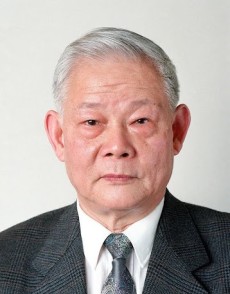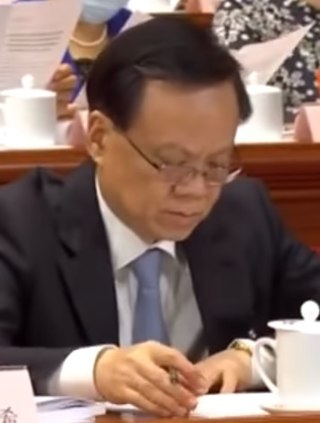Related Research Articles

Han Zheng is a Chinese politician who since 2023 has served as the vice president of China. He previously served as the first-ranking vice premier of China between 2018 and 2023,and as a member of the Politburo Standing Committee of the Chinese Communist Party (CCP) between 2017 and 2022.

Ye Xuanping was a Chinese politician,who served as Mayor of Guangzhou from 1980 to 1985 and Governor of Guangdong,his native province,from 1985 to 1991. Ye was a strong supporter of Deng Xiaoping's reform and opening policy. Under his leadership,Guangdong grew economically prosperous and gained significant autonomy from Beijing. Concerned about his power,the national government manoeuvred to relieve him of the governorship,but allowed him to maintain his power base in Guangdong. He subsequently served as Vice-Chairman of the Chinese People's Political Consultative Conference from 1991 to 2003.

Zhang Qingli born 10 February 1951 in Dongping County,Shandong) is a retired politician of the People's Republic of China. He was the first-ranked vice-chairman of the 13th National Committee of the Chinese People's Political Consultative Conference (CPPCC). He was the vice-chairman and secretary-general of the 12th National Committee of the CPPCC. Previously he was the Chinese Communist Party Committee Secretary of Tibet Autonomous Region from 2006 to 2011 and of Hebei Province from 2011 to 2013. He was a member of the 16th,17th and 18th Central Committees of the Chinese Communist Party (CCP).
The 14th Politburo of the Chinese Communist Party (CCP),formally the Political Bureau of the 14th Central Committee of the Communist Party of China,was elected at the 1st plenary session of the 14th Central Committee of the CCP on 19 October 1992 in the aftermath of the 14th National Congress. This electoral term was preceded by the 13th Politburo and succeeded by the 15th. Seven of the 21 members served concurrently in the 14th Politburo Standing Committee.
The 14th Central Committee of the Chinese Communist Party was in session from 1992 to 1997. It held seven plenary sessions. It was preceded by the 13th Central Committee. It was elected by the 14th National Congress of the Chinese Communist Party and in turn elected the 14th Politburo of the Chinese Communist Party.
The 13th Central Committee of the Chinese Communist Party was in session from 1987 to 1992. It held seven plenary sessions. It was preceded by the 12th Central Committee and succeeded by the 14th Central Committee. It elected the 13th Politburo of the Chinese Communist Party in 1987.
The 8th Central Committee of the Chinese Communist Party was in session from 1956 to 1969. It was preceded by the 7th Central Committee of the Chinese Communist Party. It held 12 plenary sessions in this period of 13 years. It was the longest serving central committee ever held by the Communist Party.

Zhang Wannian was a general of the People's Liberation Army (PLA) of the People's Republic of China.
Xie Fei was a Chinese politician. He was best known for his term as the Chinese Communist Party Committee Secretary of Guangdong between 1991 and 1998,as a member of the Politburo of the Chinese Communist Party,and as Vice Chairman of the Standing Committee of the National People's Congress.
Wang Taihua is a politician of the People's Republic of China,between 2004 and 2011,he served as director of the State Administration of Radio,Film,and Television (SARFT).
Ding Guangen was a Chinese politician who served in senior leadership roles in the Chinese Communist Party during the 1990s. He was a member of the Politburo of the Chinese Communist Party between 1992 and 2002,a member of the Central Secretariat,and one of the top officials in charge of propaganda and ideology during the term of Party General Secretary and President Jiang Zemin.
The succession of power in China since 1949 takes place in the context of a one-party state under the Chinese Communist Party (CCP). Despite the guarantee of universal franchise in the constitution,the appointment of the Paramount leader lies largely in the hands of his predecessor and the powerful factions that control the Central Committee of the Chinese Communist Party.

The Central Financial and Economic Affairs Commission is a commission of the Central Committee of the Chinese Communist Party in charge of leading and supervising economic work of both the CCP Central Committee and the State Council. The Commission is generally headed by CCP General Secretary or Premier of the State Council.

Chen Min'er is a Chinese politician and a member of the Politburo of the Chinese Communist Party who is serving as the Communist Party Secretary of Tianjin.

Lou Qinjian is a Chinese politician and computer scientist who had served as Communist Party Secretary of Jiangsu,Communist Party Secretary,Governor of Shaanxi and Deputy Minister of Industry and Information Technology. He has a Ph.D. in computer science from Huazhong University of Science and Technology.

Tan Shaowen was a Chinese politician. He served as the Communist Party Chief and top leader of the direct-controlled municipality of Tianjin,and was a member of the Politburo of the Chinese Communist Party,one of the most powerful political bodies in the People's Republic of China. However,he died in 1993 before completing the full term of his office.
Wang Hanbin is a retired Chinese Communist Party politician.

Liu He (simplified Chinese:刘鹤;traditional Chinese:劉鶴;pinyin:LiúHè;Wade–Giles:Liu2 Ho4;born 25 January 1952) is a Chinese economist and retired politician who served as a vice premier of China from 2018 to 2023. Additionally,he served as the director of the Office serving the Central Financial and Economic Affairs Commission of the Chinese Communist Party (CCP) from 2013 to 2023,the director of the Financial Stability and Development Committee from 2017 to 2023,as well as a member of the Politburo of the Chinese Communist Party from 2017 to 2022.

Zou Taofen was a Chinese journalist,media entrepreneur,and political activist. Zou was known for developing Shenghuo Zhoukan into a pioneering journal of political reporting and social commentary,and for his participation in the National Salvation Movement that mobilized opposition to the Nationalist Government and demanded stronger resistance to Japan's expansion. He was one of the so-called "Seven Gentlemen" who were arrested in 1936 and then freed in July 1937 on the eve of the Second Sino-Japanese War. During the war Zou worked in Communist held areas. He died in Shanghai,July 1944,and was granted posthumous Chinese Communist Party membership in September of that year.
Zou Jing was a Chinese engineer specializing in photosensitive materials,and an academician of the Chinese Academy of Engineering. She was a delegate to the 8th National People's Congress and a member of the 9th National Committee of the Chinese People's Political Consultative Conference.
References
- ↑ "Who's Who: Zou Jiahua". China Today. Retrieved 12 July 2013.
- 1 2 "邹家华简历". Xinhua News Agency. Archived from the original on 4 April 2003. Retrieved 12 July 2013.
- ↑ "Zou Jiahua". China Vitae. Retrieved 12 July 2013.
- ↑ China's Provinces in Reform: Class, Community and Political Culture.
- 1 2 "DOCUMENTS WITHHELD BY THE CLINTON WHITE HOUSE; Zou Jiahua". Archived from the original on 22 December 2014. Retrieved 13 July 2013.
- ↑ Mann, Jim (2 May 1994). "Clinton, China Official to Meet as Trade Deadline Nears : Diplomacy: The White House refuses to discuss unannounced meeting with Zou Jiahua. It may be last high-level talk before a decision on trade benefits". Los Angeles Times. Retrieved 12 July 2013.
- ↑ "邹家华". China Vitae. Retrieved 12 July 2013.
- ↑ 邹韬奋. 患难余生记.
- ↑ Wen-Hsin Yeh. Shanghai Splendor: Economic Sentiments and the Making of Modern China, 1843-1949. University of California Press. p. 248.
- ↑ "1999年2月22日 邹竞蒙同志不幸逝世". People's Daily. Retrieved 15 July 2013.
- ↑ "邹竞蒙". China Meteorological Administration. 15 March 2011. Retrieved 15 July 2013.
- ↑ "Zou Jiahua (邹家华) Career Data". China Vitae. Retrieved 12 July 2013.